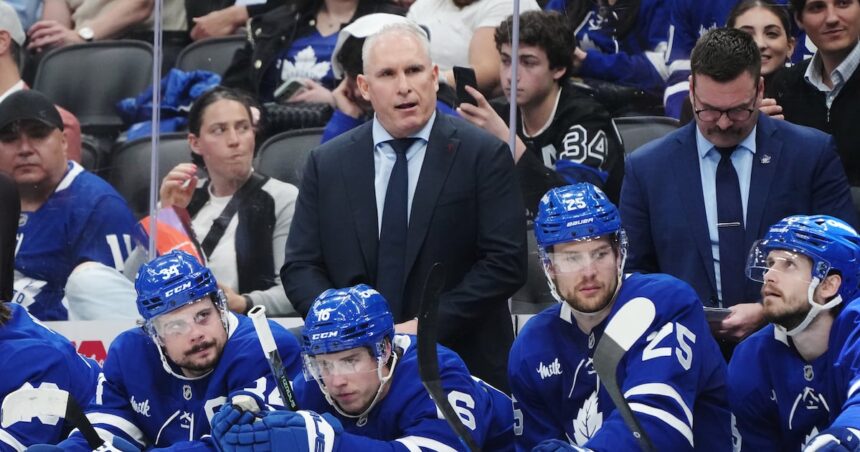I just attended the Maple Leafs’ end-of-season press conference, and the mood was exactly what you’d expect after another first-round playoff exit. The air in the room felt heavy with that familiar disappointment Toronto hockey fans know all too well.
Team president Brendan Shanahan and general manager Brad Treliving faced the media today, addressing what’s become an annual tradition – explaining why this talented team once again couldn’t advance past the first round of the playoffs. This marks the eighth consecutive first-round exit, despite the club’s regular season success.
“We’re all angry, we’re all frustrated,” Shanahan told reporters, his face showing the strain of another season ending earlier than hoped. “We share in the disappointment that our fans are feeling.”
Treliving, completing his first season as GM, emphasized that while the organization isn’t considering a complete rebuild, significant changes are coming. “Standing pat is not an option,” he said firmly. “We need to examine everything from top to bottom.”
The question of Sheldon Keefe’s future as head coach dominated much of the discussion. Neither Shanahan nor Treliving would commit to Keefe’s return, saying coaching decisions would be part of their comprehensive review process. Keefe has been behind the bench since 2019 but has yet to guide the team past the first round.
“We need to take time to evaluate properly,” Treliving explained. “These decisions can’t be made in the heat of emotion.”
Several industry insiders I spoke with after the press conference believe Keefe’s departure is likely. “The organization needs a fresh voice,” said Mark Wilson, a longtime hockey analyst. “Sometimes the message simply needs a new messenger.”
When discussing player personnel, attention naturally turned to the “Core Four” – Auston Matthews, Mitch Marner, William Nylander, and John Tavares. Speculation about trading one of these stars has reached fever pitch among fans and media alike.
Marner’s name has featured prominently in trade rumors, with his contract entering its final year. When asked directly about Marner’s future, Treliving was diplomatic but noncommittal: “Mitch is a tremendous player who has given a lot to this organization. We’ll review everything and make decisions based on what’s best for the team moving forward.”
The financial picture adds another layer of complexity. According to CapFriendly.com, the Leafs have significant salary commitments already in place for next season, limiting their flexibility to make wholesale changes without moving major pieces.
During a brief conversation after the formal portion ended, one team executive told me that fan frustration has reached an organizational tipping point. “We understand the patience has run thin,” he said, requesting anonymity to speak candidly. “The status quo simply won’t be acceptable to our supporters anymore.”
Toronto sports psychologist Dr. Emma Singh, who works with several professional athletes, offered an interesting perspective on the team’s playoff struggles. “There’s a collective psychological burden that builds with each disappointment,” she explained. “Breaking that cycle often requires significant change to reset the mental approach.”
The press conference coincided with news that several players, including Matthews, were dealing with injuries during the playoffs. Matthews underwent an MRI for an undisclosed issue that had been bothering him since before the postseason began.
What struck me most was the tone shift from previous years. Gone were the assertions about being on the right track or making progress. Instead, there was a clear acknowledgment that more dramatic changes might be necessary to break this cycle of playoff disappointment.
For Toronto fans, the summer ahead promises to be one of significant change. Whether that includes a new coach, trades involving core players, or both, remains to be seen. But as I left the press conference and walked past a group of fans gathered outside, their expressions told the story – patience has run out, and the time for meaningful change has arrived.
The Maple Leafs’ front office now faces perhaps its most critical offseason in recent memory, with decisions that will shape the franchise’s direction for years to come.







